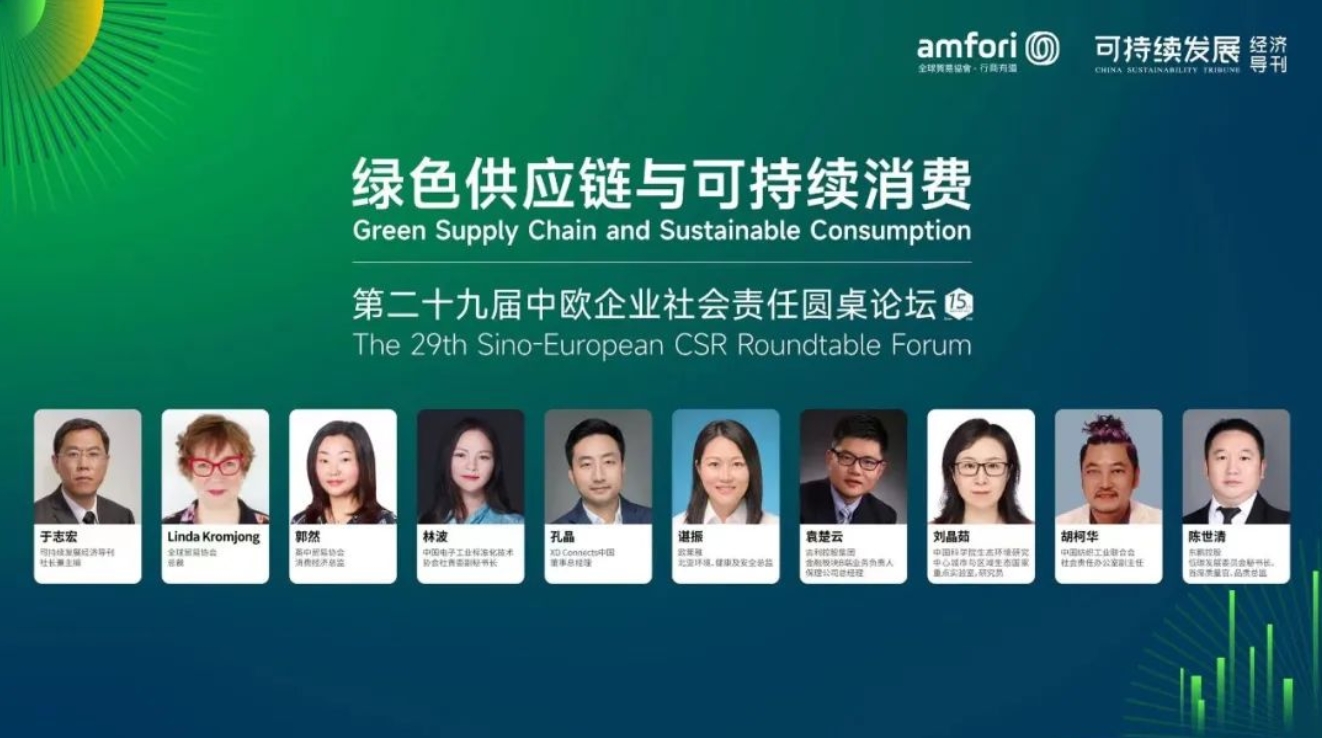
On December 7, 2023, the 29th Sino-European CSR Roundtable Forum, organized by amfori and China Sustainability Tribune, was held in Beijing.
With the theme of "Green Supply Chain and Sustainable Consumption," the forum invited representatives from well-known company representatives, sustainability experts, brands and suppliers to share the insight into Chinese and European policies on sustainable consumption as well as corporate practices on green supply chain management, aiming to advocate supply chain enterprises to take a series of actions throughout the entire product life cycle, and promote structural reforms and low-carbon production that meets the demands of sustainable consumption.
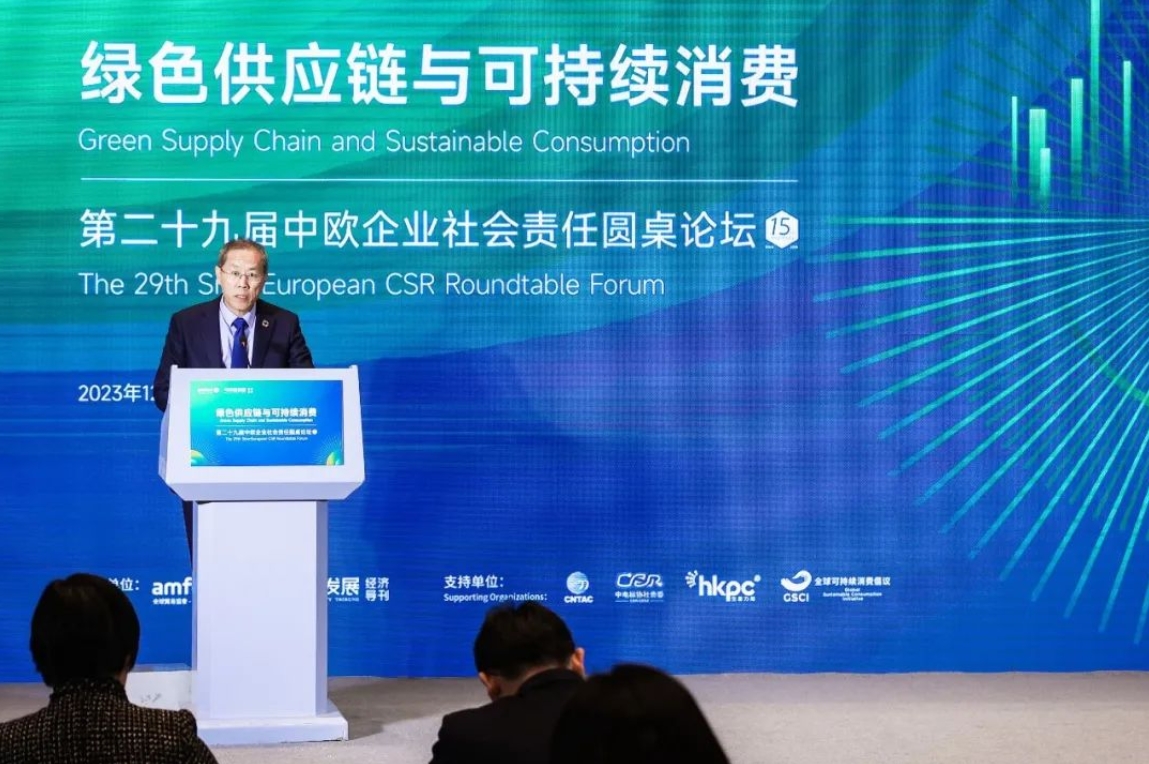
Mutual promotion of sustainable production and consumption
During the welcoming address, Ms. Linda Kromjong, President of amfori, introduced the EU legislation to address the systemic challenges in the global supply chain. And she pointed out that green supply chains and sustainable consumption are at different ends of the same value chains. It takes a joint effort from business, regulatory bodies, CSO, producers as well as consumers to work together to achieve green supply chains and sustainable consumption successfully.
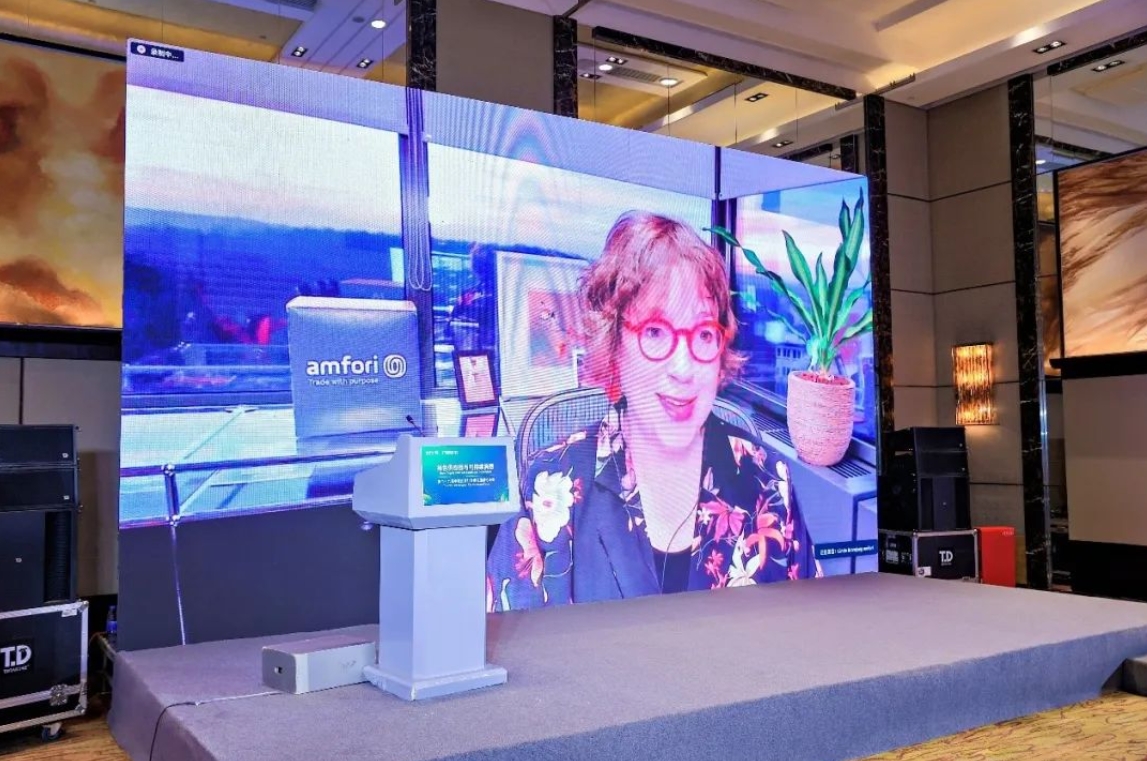
She emphasized, “Collaboration is the key to success! We should not wait! We need to act now!”
Mr. Song Qisen, Director, General Office, Department of Consumer Goods Industry, Ministry of Industry and Information Technology (MIIT), stressed in his welcoming address that the consumer goods industry is an organic intersection for implementing the strategy of expanding domestic demand and deepening supply-side structural reform. It is also a critical link in promoting dual circulation in which China's domestic market remains the mainstay with domestic and international markets reinforcing each other.
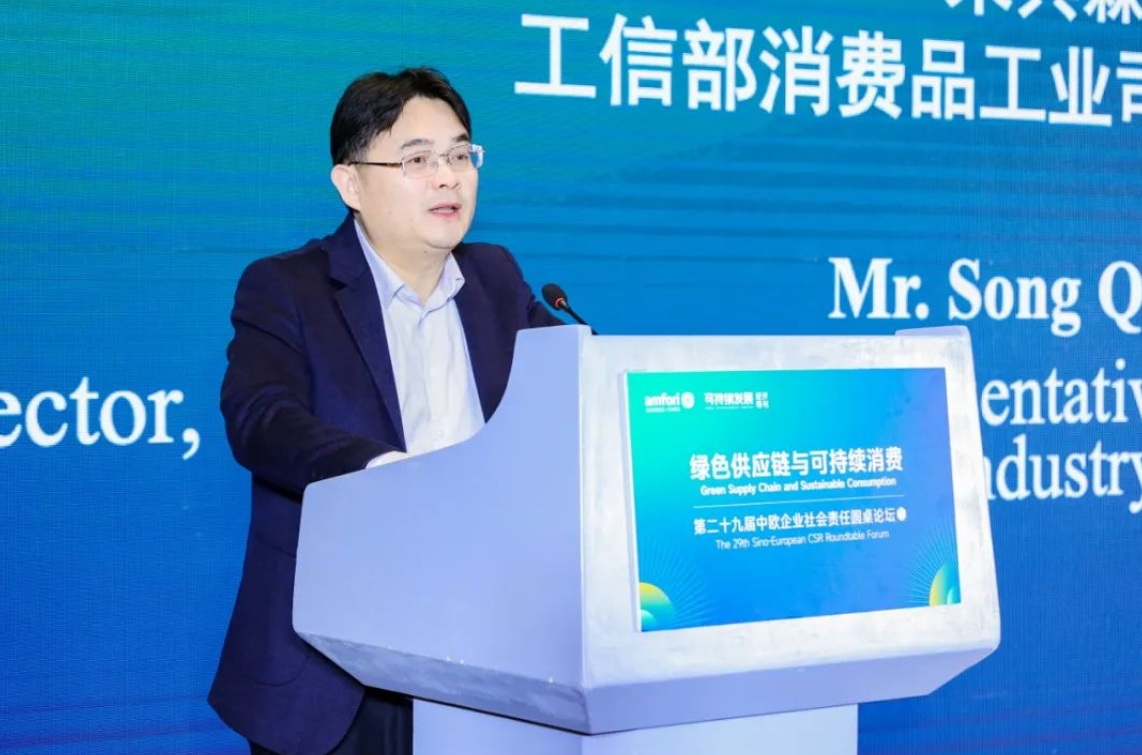
He shared that sustainable consumption plays an important role not only in driving supply-side structural reform and sustainable production and operation of enterprises but also in promoting the green production mode across society as a whole. The Department of Consumer Goods Industry of the Ministry of MIIT, together with relevant departments, will cultivate manufacturing and consumer brands in different categories, and hierarchically build a lineup of Chinese consumer goods, aiming to lead supply innovation through consumer upgrades and adapt supply innovation to personalized, differentiated, and quality-oriented consumer demands. The goal is to continuously expand the supply of high-quality consumer goods and mid-to-high-end products to meet the increasing aspirations of the people for a better life.
He also expressed anticipation for the Sino-European CSR Roundtable Forum, "I hope the forum can serve as a platform for communication and collaboration, consolidate consensus among various sectors of society, and disseminate the philosophy of sustainable consumption."
During the keynote speech session, Ms. Guo Ran, Director, Consumer Economy China, China-Britain Business Council, introduced the sustainable consumption in the UK and shared some cases.
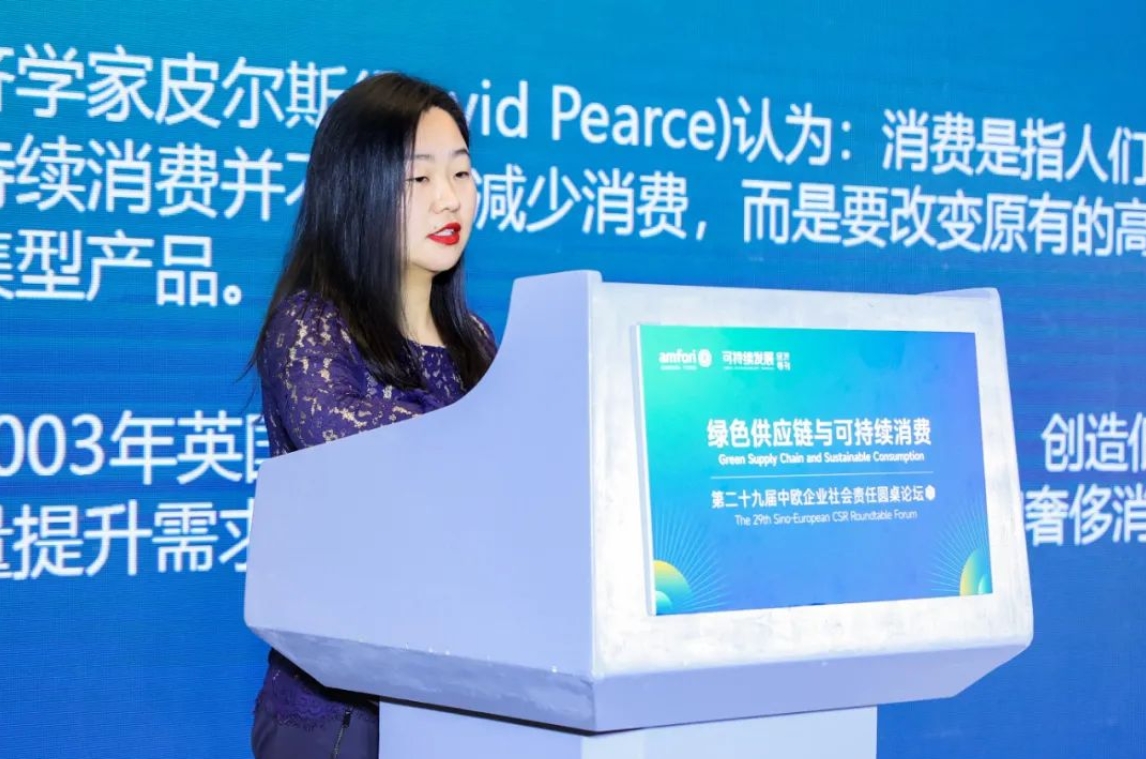
She said that the UK is currently planning to promote environmental sustainability in three ways: ensuring the competitive development of sustainable products or services in the market, popularizing consumer awareness of the climate impacts of purchased goods, and ensuring that competition law does not unnecessarily obstruct businesses seeking environmentally sustainable development. These efforts aim to accelerate the UK's transition to a zero-carbon economy.
She also highlighted an increasing proportion of consumers considering the "circularity" of their consumption behavior. Moreover, consumers’ concerns about sustainability issues further impact the product manufacturing and supply chain processes of businesses.
Ms. Lin Bo, Deputy Secretary-General of CSR Committee, China Electronics Standardization Association, elaborated on " Sustainable Consumption Driven by Green Supply Chains in ICT Industry."
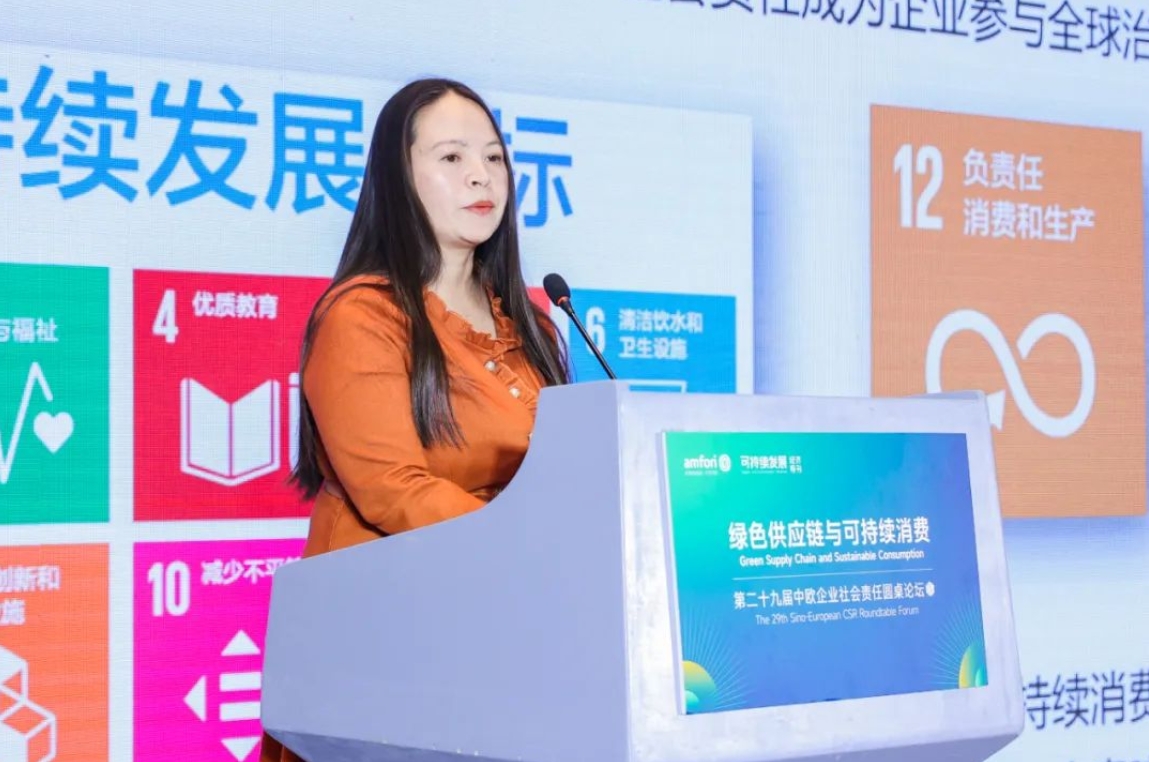
She said, "Given the current trend, many enterprises in China now recognize the close connection between the 30 · 60 Decarbonization Goal and consumer demands. They are progressively introducing lower-carbon products and services to create a favorable new consumption environment. Building green supply chains is pivotal in promoting sustainable consumption."
Drawing from exemplary practices, she offered five recommendations to businesses: Firstly, continuously strengthen technological innovation to support the industry's green and low-carbon development; secondly, promote green supply chain through green procurement; thirdly, enhance suppliers' environmental awareness and management; fourthly, increase transparency in green supply chains; lastly, guide and elevate consumers' awareness of green consumption.
Mr. King Kong, Managing Director China, XD Connects, shared the company’s experiences by leveraging sustainable innovation to change the way we give, including products and supply chains.
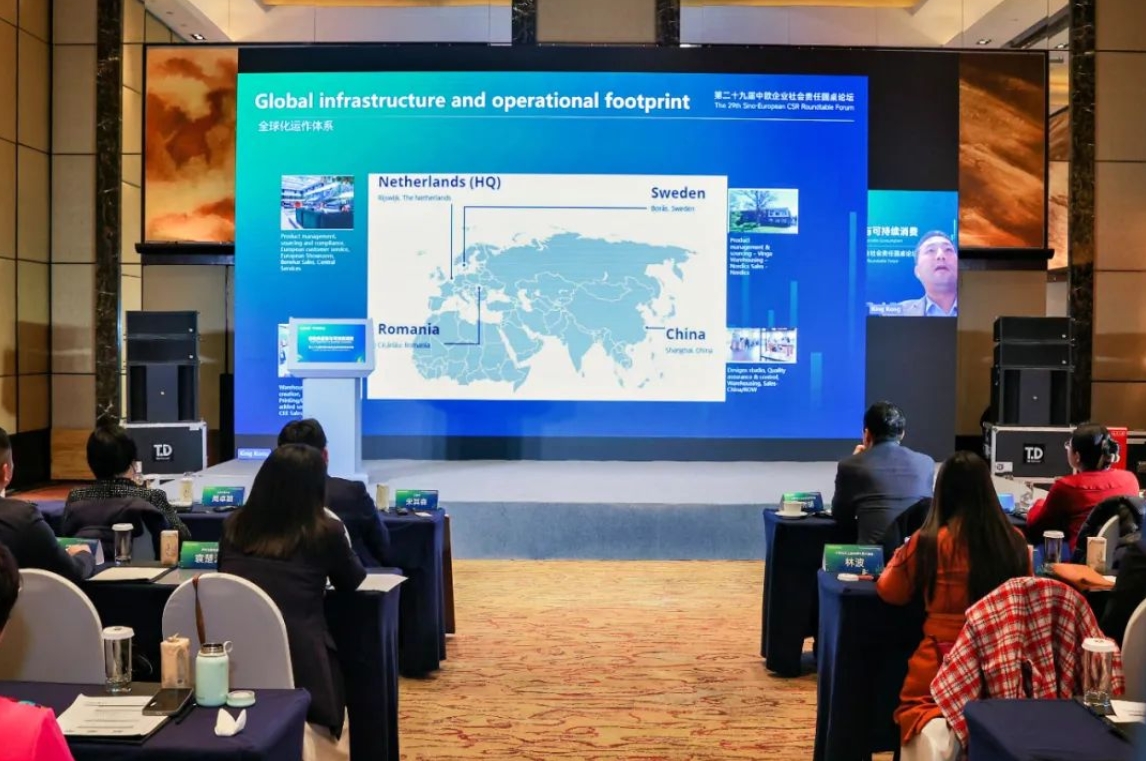
He mentioned that XD Connects extensively integrates cutting-edge technologies in product design. This includes the use of recycled and renewable materials, low-pollution manufacturing processes, energy-efficient packaging, and transportation solutions. They adhere to strict standards for detailed control to achieve comprehensive carbon reduction goals, providing public disclosure of the carbon footprint for all products.
Moreover, XD Connects actively develops proprietary technologies such as Aware Technology to verify the sustainability of the entire supply chain. "The future belongs to collaboration," he urged, "Whether in technological means, production processes, or market sales, cooperation is essential to achieve mutual success.
Ms. Cindy Chen, L'Oréal North Asia EHS Director, introduced L'Oréal's end-to-end sustainability strategy aimed at leading green consumption.
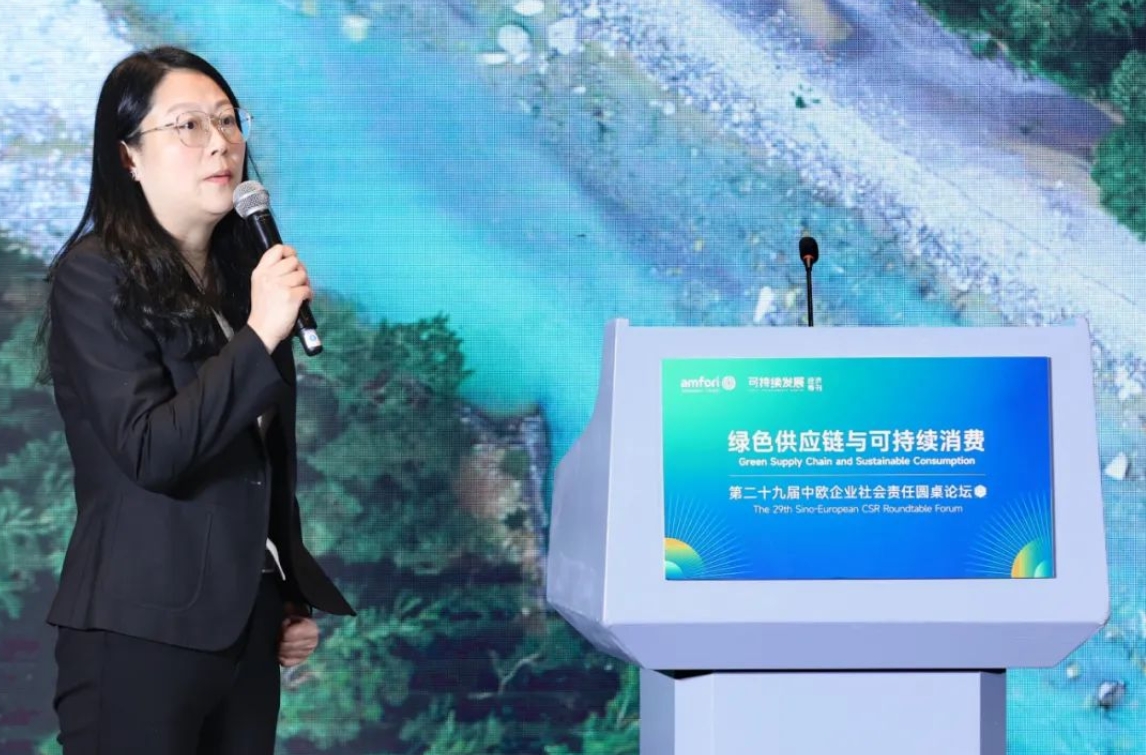
She said that in procurement, L'Oréal empowers the upstream and downstream ecological chain with four pillars of sustainable sourcing. In terms of product design, the company promotes product innovation through the ways of green science and the 3R principle (Reduce, Reuse, Recycle). For production, manufacturing footprint lead as the role model. Concerning logistics and distribution, efforts are made to establish a pure beauty supply chain and fulfillment network near to consumers. Regarding consumers, L'Oréal guides green consumption through initiatives such as launching the product environmental impact labeling to empower consumers, transforming from circular parcel to empty bottle upcycling, and providing platforms for consumer engagement.
Mr. Yuan Chuyun, Head of B-end business in the financial sector of Geely Holding Group and the General Manager of Wisdom Puhua Factoring Company, , shared about how Geely's financial sector explore industrial finance to empower green development of automotive supply chain.
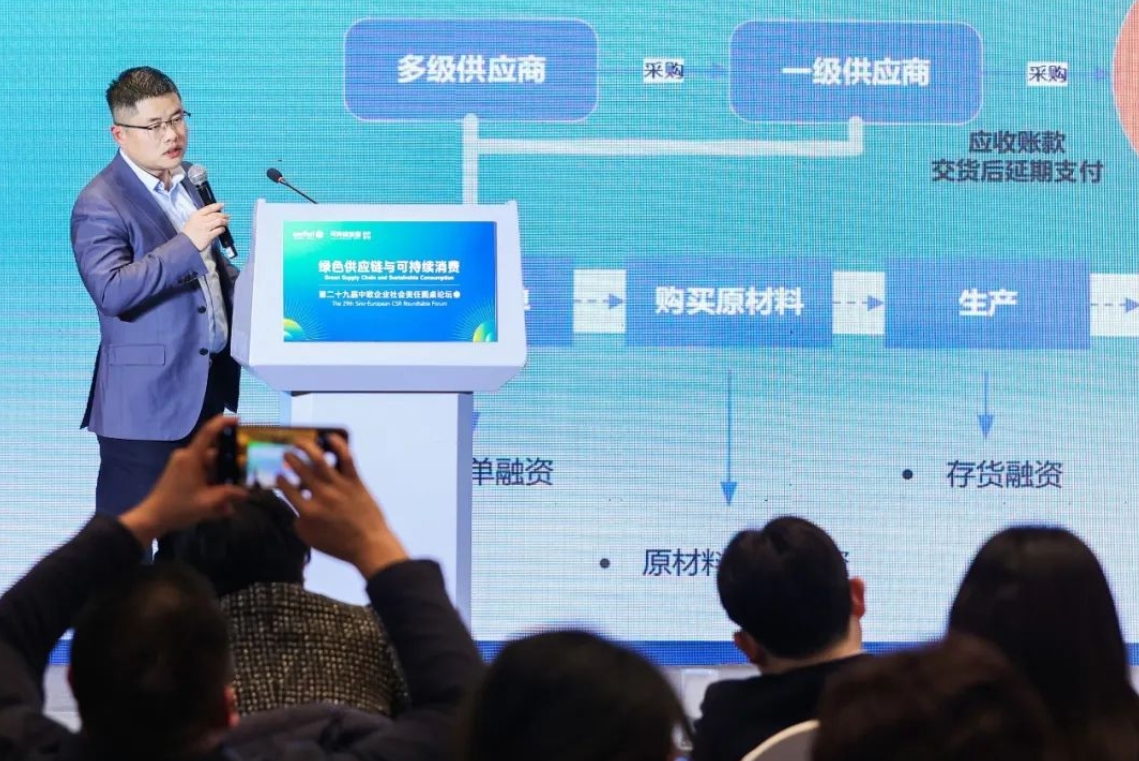
According to his presentation, Geely's financial sector positions itself as a connector. On one hand, it provides financial services to automobile suppliers and distributors adhering to ESG standards, offering more favorable interest rates, higher approval limits, and faster approval processes. On the other hand, it promotes global ESG-compliant governance through financial products, encouraging automobile suppliers and distributors to actively opt for low-carbon and sustainable development, ultimately contributing to the entire Geely automotive industry's ecosystem.
Effectively integrating risk management in financial operations with the non-financial factors emphasized by ESG is a significant challenge," said Mr. Yuan, “Companies need to follow the logic of sustainable development, transform it into corporate motivation, and ensure this motivation receives positive feedback in a continuous cycle.
Promoting green and low-carbon extension across the entire industry chain
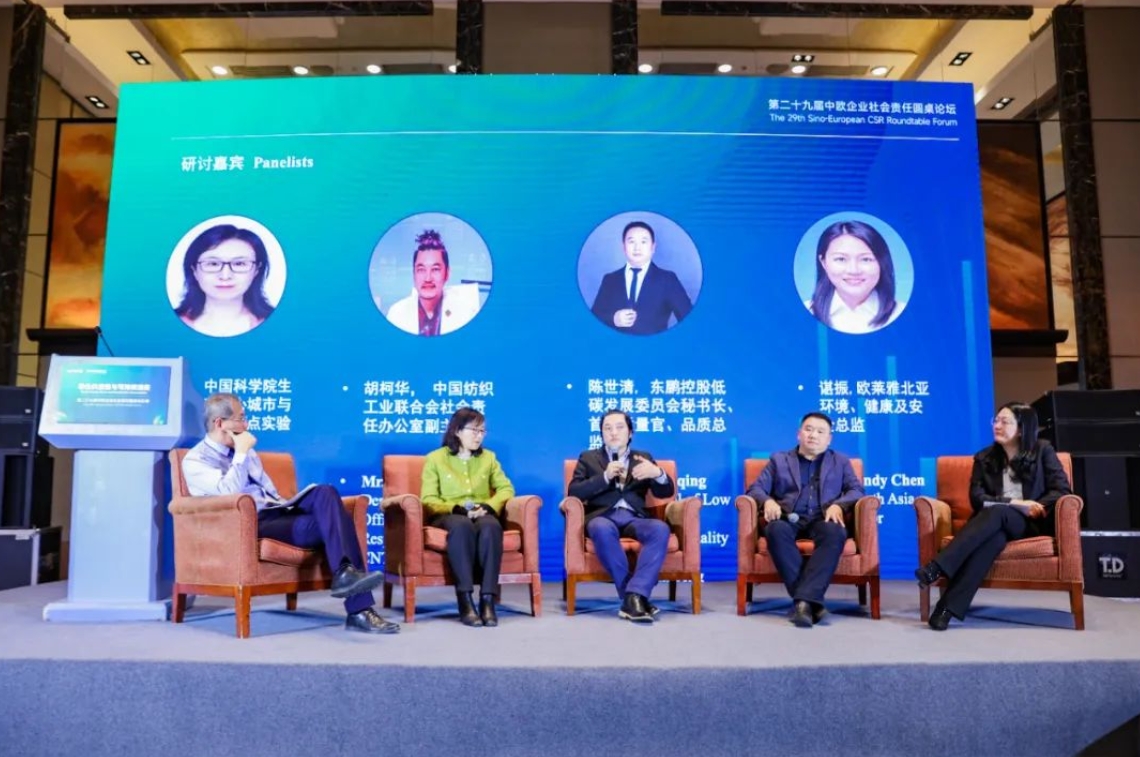
In the panel discussion, representatives shared their views on how to respond to the new trends of supply chain management in the context of sustainable consumption.
Ms. Liu Jingru pointed out that while consumption and production hold equal status in economic and social activities, there is a greater focus on the production end when it comes to providing solutions to environmental issues. It is more challenging to gather statistics on the consumption end. The concept of ecological construction needs continuous expansion, moving from the production end to the consumption end, which is the core value of a green supply chain.
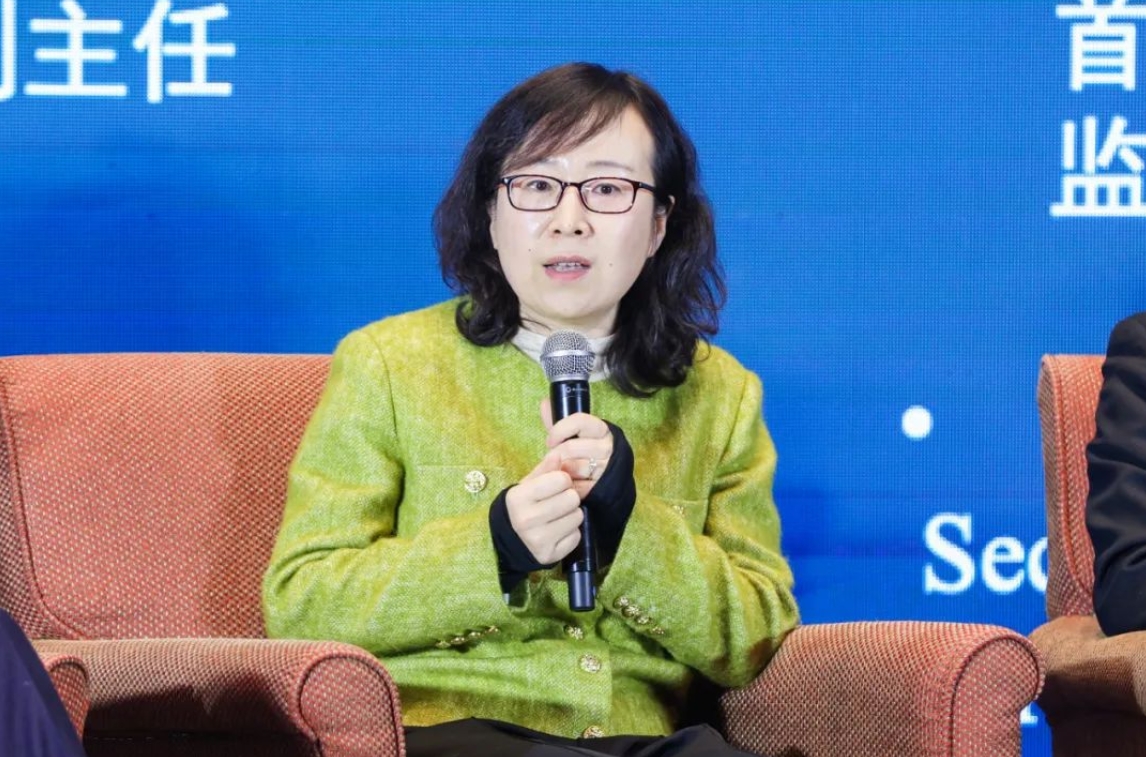
She further highlighted that promoting sustainable consumption requires attention to two key elements. First is the product life cycle, where numerous stakeholders need to integrate within this framework, especially in formulating policies based on this concept. Second is the balance; a holistic assessment of the product life cycle requires the development of systematic assessment methods and tools, along with accurate foundational data.
The green supply chain operates on the principle of the shortest board, where the shortest plank determines the level of sustainability. Conversely, sustainable consumption follows the longboard principle, where people tend to focus solely on the longest plank. The challenge lies in coupling the mechanisms between these two to achieve harmony.
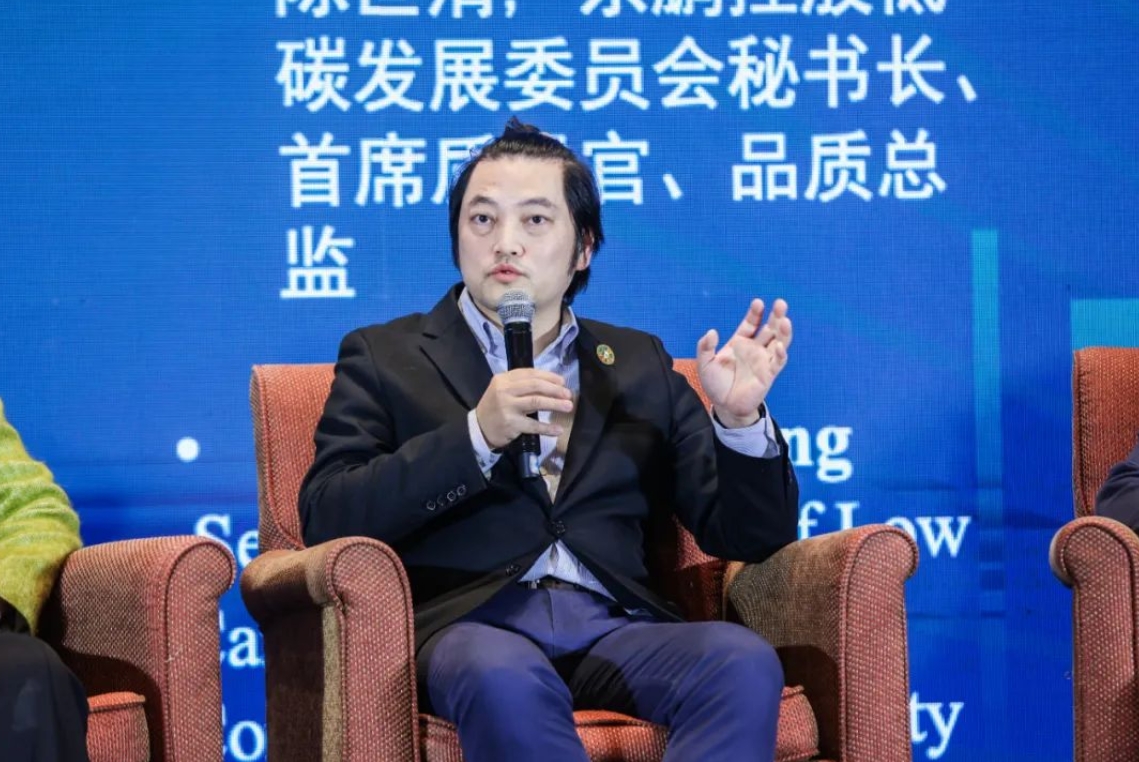
Mr. Hu Kehua pointed out that the green supply chain and sustainable consumption are different principles with relatively abstract and dynamic concepts, characterized by vague definitions. Products serve as tangible junctures between these concepts, possessing various assessable and quantifiable indicators of greenness and sustainability.
He emphasizes the need to expedite the establishment of localized green product databases and local digital platforms to foster consensus between the production and consumption ends.
"Sustainable development is not a burden for enterprises but an opportunity and benefit." Mr. Chen Shiqing emphasized that sustainable consumption drives sustainable development. Enterprises need to establish a green value chain across the entire process to better meet consumption demands. Taking the construction industry as an example, the multi-billion market for repetitive renovations in second-hand houses provides ample opportunities for resource recycling. Waste generated from continuous urban updates in various cities can also be reused as raw materials by relevant enterprises.
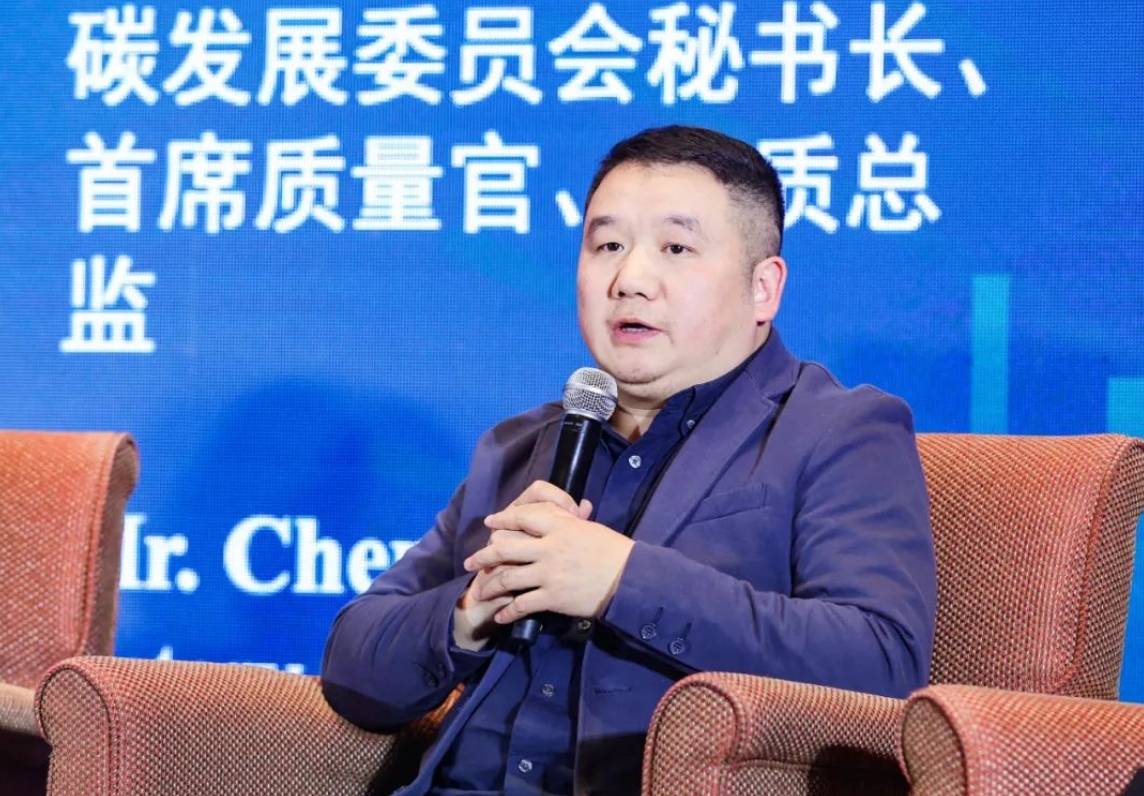
He also said that enterprises should create socially appealing products to expand the high-quality consumer base, thereby guiding more people to participate in the development of green buildings.
Ms. Cindy Chen pointed out that forging sustainable operational concepts and carbon reduction strategies is the core of sustainability across the entire industry chain. In the future, as China's industrialization and consumption upgrade continue, the proportion of carbon emissions from China's consumption side will increase. Leading enterprises in various consumption market sectors should continue their sustainability strategies and, , also advance industrial chain transformation in the following five aspects through close collaboration with strategic suppliers:
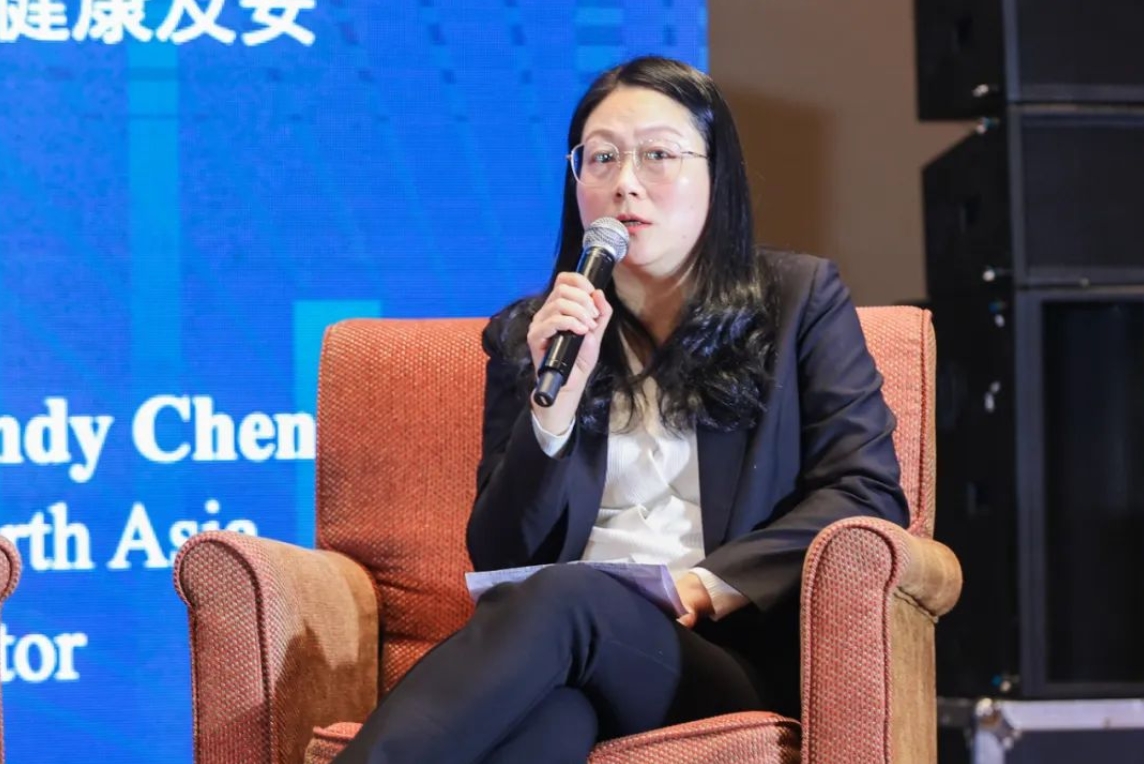
Firstly, understand the carbon reduction willingness and current carbon emission levels of strategic suppliers; secondly, assist strategic suppliers in developing the carbon emission reduction approaches and identifying matching carbon reduction techniques; thirdly, encourage carbon emission reduction through equipment upgrades and modifications; fourthly, establish renewable energy equipment in industrial parks; lastly, achieve carbon neutrality by connecting renewable energy sources.
"The development of green supply chain and sustainable consumption is complex and uncertain. Finding consensus between the two is crucial, allowing sustainable consumption and production to embrace and integrate closely," said Mr. Yu Zhihong, President and Editor-in-chief, China Sustainability Tribune, in his concluding remarks at the forum.
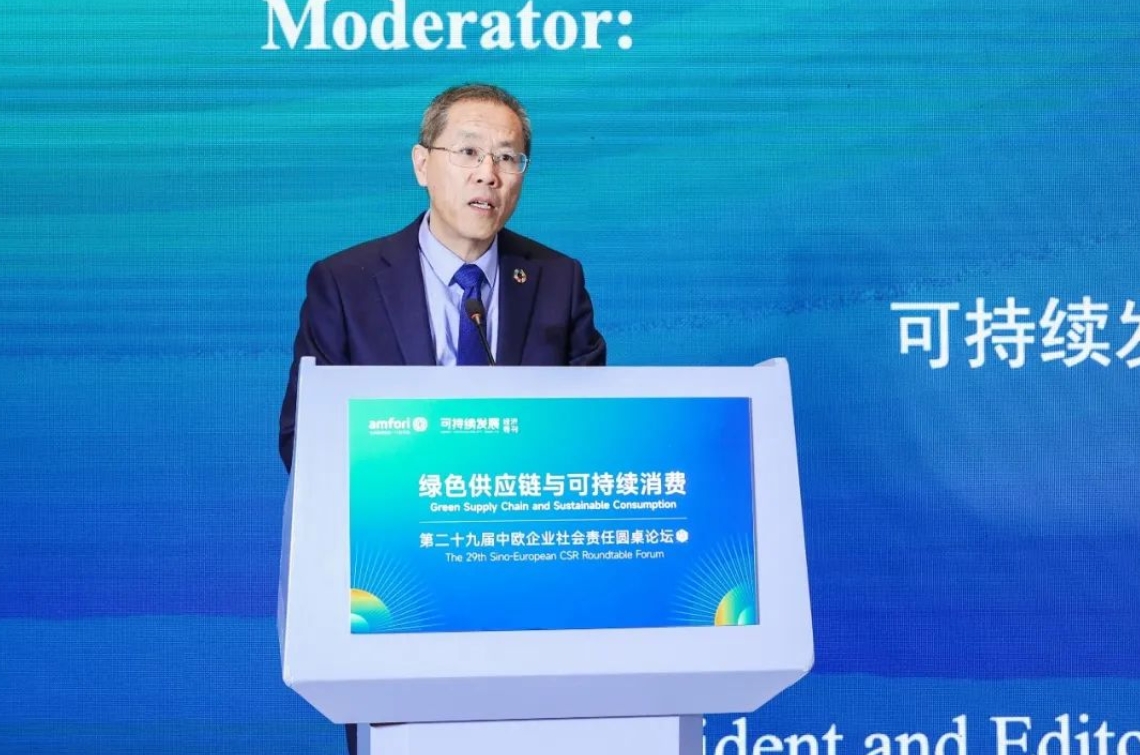
He further noted that giving special attention to green supply chain and sustainable consumption is the choice of influential brands, driven both by mission and policy. It is expected to develop concise and effective methodologies and tools by governments, institutions, and businesses to collectively advance the infrastructure construction of green supply chains and sustainable consumption.
The Forum was chaired by Mr. Yu Zhihong, President and Editor-in-chief, China Sustainability Tribune. It received substantial support from the China National Textile and Apparel Council (CNTAC), China Electronics Standardization Association – CSR Committee (CESA – CSR), Hong Kong Productivity Council(HKPC), and the Global Sustainable Consumption Initiative(GSCI). The forum provided a live streaming channel on the internet with nearly over 344,000 viewers, both online and offline.


 Back
to top
Back
to top